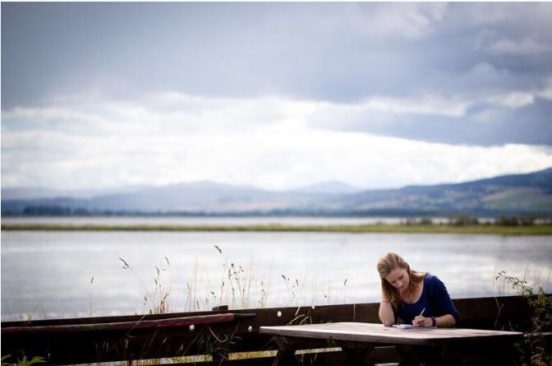Since the first cases of Covid-19 were confirmed in the UK, the freedoms of movement, socialisation and conviviality that many of us take for granted have been radically reduced. But for patients who are chronically ill, the social patterns currently dictated by the government are very familiar. My social anthropology research involves fieldwork with Lyme disease patients in Scotland whose lifestyles are dictated by their immune systems. Where they go, how long they leave home, and who they meet, are all carefully managed in accordance with their immune systems. So when coronavirus hit the United Kingdom, I expected the pandemic to dominate conversations in the Lyme disease circles as much as it did in my other circles. Coronavirus is after all touching all corners of the world. But to my surprise the one place coronavirus did not dominate was in the world of Lyme disease.
The online forums continued at their normal pace: exchanging the latest medical research, supportive stories of everyday victories, reaching out for comfort. Discussions of coronavirus trickled in over the weeks but most of the time my participants had other things on their mind. This was not the sheer panic I was seeing in the mainstream media. I asked Pauline, one of my participants, who told me: “It will work itself out. Life goes on.” No matter which angle I tested, Pauline resisted falling into the patterns of panic I was seeing everywhere else. I was ready to categorise her lightheartedness as a poised British coping mechanism when she said: “People were having a panic and I was saying, ‘There’s nothing you can do about it’ because I think the stress makes them worse.”
Her words boomed with familiarity. The stress, anxiety, and fear all around us are familiar emotions to Pauline who, like so many other Lyme disease patients, had spent years managing their impact on her mental health. In this time of radical uncertainty, the ones with a map are those experienced with dealing with the mental health impacts of risk: chronically ill patients. Speaking to other research participants seems to confirm this. Lyme disease patient and advocate Alice stated frankly: “I don’t feel too much out of depth. I’ve been terrified for 13 years and I’m not getting any more terrified.” The author of Finding Joy, a novel based on her 10 year experience living with Lyme disease in Inverness, Morven-May MacCallum said, “When you have Lyme disease, you live with death for so long, it becomes normal”.
As coronavirus sweeps across the planet, it is also inverting the world from a place of health to a place of illness. What may be strange and frightening ‘states of pandemic’ to many are, to those who living with chronic illnesses, continued ‘states of normality’. To them, this new world ruled by stockpiling, isolation and social distancing is comfortable territory: “This is what’s known to us. This is what we’re good at. We know to buy our medication in advance. We know how to avoid germs, avoid people,” Morven-May said. “Everybody is entering our world, whereas before we were trying to enter your world.”
To those of us entering this new world, some comfort may be found in knowing it is already inhabited and in listening to its inhabitants. My participants’ journey will now sound all-too familiar: mourning the end of a way of life; changing from being active members of communities to being house-bound; confining big lives into small spaces. Difficult as it may be, we have the important opportunity to make visible the chronic patients who have experience and listen.
Given the multitude of platforms available for contact (Skype, Facetime, WhatsApp, Snapchat), Alice suggests the term ‘social distancing’ is inaccurate. “Socially we might come closer in many ways,” she says. The term may even be problematic as it can generate unnecessary fear of isolation. “Make every attempt to try and maintain social interaction even if you’re physically isolated,” Alice recommends.
Both Morven-May and Alice recall the pressures isolation had on their mental health. “For each person, self-isolation will bring out different things,” Morven-May admits. “Some people will become claustrophobic, irritable, apathetic, retract into themselves, they won’t want human company at all.” Alice warns of the loss of self-esteem when the sources for it are gone: “If you’ve lost your ability to work, the esteem that comes from that might dissipate. People will start to question themselves so they should try and do something to avoid this.” To this, Morven-May recommends finding laughter to dissipate the anxiety and honouring the simple comforts. She recalls: “One thing that made a difference to me when I was really unwell is get a chair and sit it by the window, open the window and just breathe in fresh air. People need to look for those little luxuries.”
As we navigate the lockdown and adapt to this changed world, new and important conversations become possible, perhaps with a lasting effect: “Maybe it’s a moment for people to have empathy with those who are trapped inside their homes more permanently,” Morven-May hopes.
This post was first published on somatosphere.net on 29th March 2020
With gratitude to the participants of my PhD research: Alice, Morven-May and Pauline.
Ritti Soncco is a PhD candidate in Social Anthropology at the University of Edinburgh with the Carnegie Trust for the Universities of Scotland. Her research focus is Lyme disease, medical knowledge, and patient-advocacy. Contact: ritti.soncco@ed.ac.uk // Twitter: @rittisoncco










Comments by astreet